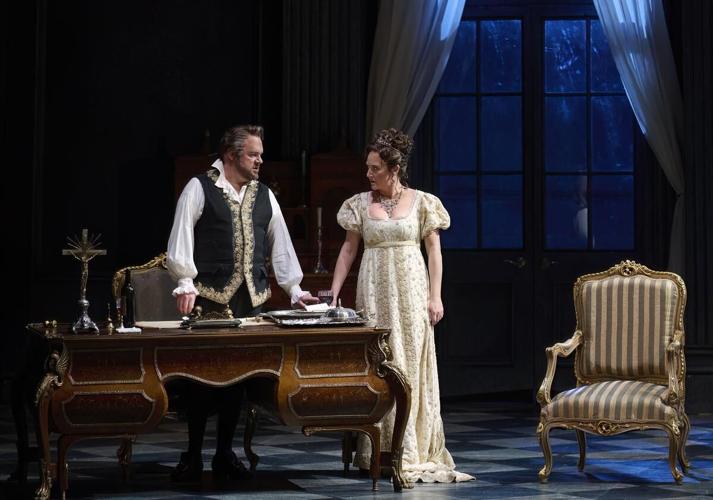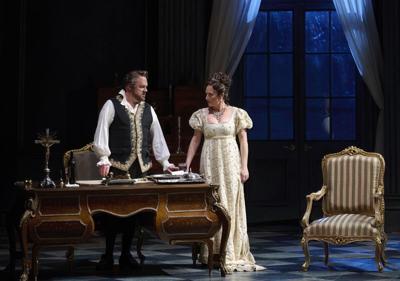Macbeth
3.5 stars
By Giuseppe Verdi, directed by David McVicar and conducted by Speranza Scappucci. Presented by the Canadian Opera Company. Through May 20 at the Four Seasons Centre for the Performing Arts, 145 Queen St W. or 416-363-8231
Tosca
3.5 stars
By Giacomo Puccini, directed by Paul Curran and conducted by Giuliano Carella. Through May 27 at the Four Seasons Centre.
How do you cap off your first full season of opera in more than three years?
If you’re the Canadian Opera Company, you present a thrilling new production of a Verdi tragedy, couple it with a sumptuous remount of an Italian classic and anchor them with a pair of astounding performers in the title roles.
For the COC, that spring gambit of ‚ÄúMacbeth‚ÄĚ and ‚ÄúTosca‚ÄĚ has proven a clever one-two punch of programming to wrap up a solid season to remember.

Quinn Kelsey as Macbeth and Alexandrina Pendatchanska as Lady Macbeth in the Canadian Opera Company’s new production of “Macbeth.”
Canadian Opera CompanyMacbeth
First up: a chillingly terrifying new staging of Verdi‚Äôs ‚ÄúMacbeth,‚ÄĚ directed with intense precision by Scottish director David McVicar.
In a season filled with revivals of existing productions, this COC premiere ‚ÄĒ a new co-production with Chicago‚Äôs Lyric Opera ‚ÄĒ is arguably the most significant opera of the year.
It doesn’t disappoint.
McVicar latches on to the inherent darkness of Verdi’s opera, inspired by Shakespeare’s tragedy of the same name about a Scottish king driven by ambition but who crumbles at the hands of his paranoia.
The production‚Äôs characteristic darkness is presented not just visually but also metaphorically. David Finn‚Äôs dimly lit and shadow-filled lighting design conjures an appropriate setting where ‚Äúfair is foul, foul is fair,‚ÄĚ emphasizing the tale‚Äôs focus on illusion and the supernatural.
Likewise, John Macfarlane‚Äôs set places the action in a decaying Scottish church. That the bloody tragedy unfolds in this sacred locale suggests McVicar wants to highlight the corruption ‚ÄĒ even the perversion ‚ÄĒ of a society bereft of warmth and consumed with calculated greed.
As the titular character, American baritone Quinn Kelsey possesses a resounding voice, plowing through Macbeth’s volatile temperaments with aplomb.
Equally compelling is Canadian tenor Matthew Cairns as Macbeth‚Äôs foil, Macduff. His emotionally charged performance of ‚ÄúAh! la paterna mano‚ÄĚ in the fourth act rightly earned the most sustained ovation on opening night.
Also deserving of praise is the indefatigable COC chorus, under the direction of conductor Speranza Scappucci. They sing, dance and act, playing everything from the witches (a congregation of church ladies in this production) to soldiers.
If there’s a weak link in the company, it’s Alexandrina Pendatchanska as Lady Macbeth (sharing the role with Liudmyla Monastyrska after superstar soprano Sondra Radvanovsky withdrew due to personal reasons). Though appropriately chilling in the role, the soprano doesn’t quite capture the queen’s ruthless ambition nor is she utterly convincing in Lady Macbeth’s descent into madness.
Still, this ‚ÄúMacbeth‚ÄĚ is some potent stuff and will undoubtedly continue to thrill audiences for years to come now that it has entered the COC‚Äôs repertoire.
Tosca
If ‚ÄúMacbeth‚ÄĚ presents a world where coldness and manipulation breed jealousy and eventual tragedy, then Puccini‚Äôs melodrama ‚ÄúTosca‚ÄĚ reveals how fiery passion and unbridled love can also lead down the same path.
Director Paul Curran’s remount of his 2008 production is sensual and sweeping, completely surrendering to the ravishing grandiosity of Puccini’s music.
It starts with the COC orchestra, under the baton of conductor Giuliano Carella, whose polished interpretation accentuates the soaring melodies and reverberant leitmotifs throughout the score.
In the lead role, Sinéad Campbell-Wallace enthralls with her vinous voice. (She shares the role with Keri Alkema, after Olga Busuioc withdrew due to health reasons.) Her Tosca is wry and charming in the opening act, catching the eye of painter Cavaradossi (Stefano La Colla).
But when she’s caught in a love triangle with the malevolent police chief Scarpia (Roland Wood), who also yearns for Tosca and wants to remove Cavaradossi from the picture, she develops a grittier, hard-edged guise.
Her second act aria, ‚ÄúVissi d‚Äôarte,‚ÄĚ in which Tosca laments how the fate of her lover is in Scarpia‚Äôs hands, is delivered by Campbell-Wallace with impressive vocal clarity and depth of emotion. You wonder whether Puccini would still have so seriously considered cutting the iconic piece because it ‚Äúheld up the action‚ÄĚ if he listened to Campbell-Wallace‚Äôs devastating rendition.
In the vocal department, Campbell-Wallace is equally matched with La Colla and Wood, both powerhouse performers who run away with their respective arias.
As Cavaradossi, however, La Colla lacks the blazing ardour that Campbell-Wallace brings to her role, making for a somewhat uneven performance acting-wise from the leading couple.
But that‚Äôs a minor nitpick, especially considering that Curran‚Äôs production draws your eyes away from the minute details and toward Kevin Knight‚Äôs palatial set designs. Though ‚ÄúTosca‚ÄĚ is as much a political thriller as ‚ÄúMacbeth,‚ÄĚ it‚Äôs lighter fare than Verdi‚Äôs tragedy. Curran and his creative team lean heavily into the romantic drama, even if they rely too much at times on physical comedy, particularly in the first act.
But paired with McVicar‚Äôs unrelenting ‚ÄúMacbeth,‚ÄĚ Curran‚Äôs ‚ÄúTosca‚ÄĚ makes for a perfect, if unlikely, antithetical companion.
This article has been updated from a previous version to clarify that La Colla played Cavaradossi.
Correction ‚ÄĒ May 25, 2023: ‚ÄúVissi d‚Äôarte‚ÄĚ is the second act of Tosca, not third as previously reported.





























To join the conversation set a first and last name in your user profile.
Sign in or register for free to join the Conversation